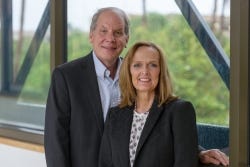![Mark Atkinson, Ph.D., is the director of the UF Diabetes Institute and the president of Insulin for Life USA, a nonprofit organization that provides diabetes medications and supplies to people in developing countries. Carol Atkinson, his wife, serves as the program coordinator for Insulin for Life USA. [Special to the Press Gazette]](http://127.0.0.1/wordpress/wp-content/uploads/2022/01/ghows-DA-6d5984c1-b7ce-3990-e053-0100007fc024-66aeb4f4.jpeg)
GAINESVILLE — Mark Atkinson, Ph.D., director of the University of Florida Diabetes Institute, has been selected to receive the American Diabetes Association’s 2018 Albert Renold Award for his impact in the field of diabetes research.
Atkinson also is the founder of the Network for Pancreatic Organ donors with Diabetes, or nPOD, which he believes is the main reason he has been chosen to receive this award.
Until about 11 years ago, researchers used mice to find a way to prevent and cure Type 1 diabetes. They found about 400 ways to do so, Atkinson said, but researchers still have not found a solution for humans.
"It got to the point where I just said, ‘There has to be something different,’" he said.
Atkinson said he founded nPOD with the hope of curing and preventing Type 1 diabetes in humans by collecting and analyzing tissues from organ donors with the disease.
The network coordinates with practically every organ procurement organization in the United States to receive organs from donors who had Type 1 diabetes, he said. These organs are taken to the Atkinson Lab at UF to be processed, and the results are sent to investigators all around the world.
"nPOD is one-of-a-kind research," he said. "There’s not really anything like it."
Atkinson will receive the award at the ADA’s 78th Scientific Sessions, which will be held June 22-26 in Orlando.
In addition to founding nPOD, Atkinson has dedicated over 30 years to investigating Type 1 diabetes and has been published roughly 381 times.
Atkinson said he is honored to receive the award and couldn’t have done it without the help of his UF and nPOD teams.
"In this case, I’m really accepting this award ‘on behalf of’ because … it’s all the people that are doing the studies, publishing the papers and making knowledge gains that really make this worthwhile," Atkinson said.
This article originally appeared on Santa Rosa Press Gazette: UF Diabetes Institute director to receive national honor for research achievements
